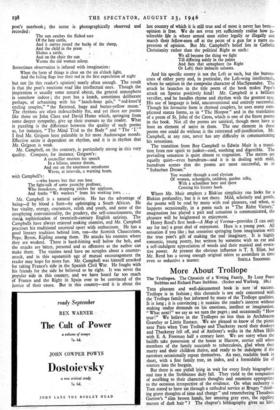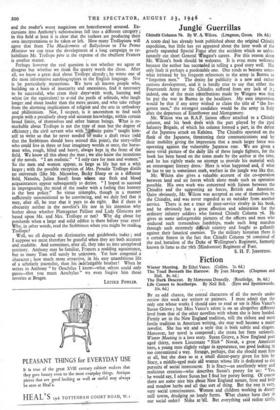More About Trollope
Tills pleasant and well-documented book is sure of success. Trollope is in fashion ; -this chronicle is not only concerned with the Trollope family but informed by many of the Trollope qualities. It is long ; it is convincing ; it sustains the reader's interest without making undue demands on his emotions, intellect or imagination. " What next?" we say as we turn the pages ; and occasionally "How true!" We believe in the Trollopes no less than in Archdeacon Grantley or Lizzie Eustace. We are pleased to know of the picnic near Paris when Tom Trollope and Thackeray raced their donkeys and Thackeray fell off, and of Anthony's walks in the Alban Hills with E. A. Freeman half a century later. We are sorry when the bailiffs take possession of the house at Harrow, sorrier still when members of the family succumb to tuberculosis, glad when they marry and their children thrive, and ready to be indulgent if the narrators occasionally repeat themselves. An easy, readable book in short, with a fine family tree, an index, and a formidable list of sources into the bargain.
But there is one pitfall lying in wait for every lively biographer ; and into it the Stebbinses duly fall. They yield to the temptation of ascribing to their characters thoughts and emotions appropriate to the occasion irrespective of the evidence. On what authority is Tom stated to have sat through a cathedral service at Bruges " think- ing grave thoughts of time and change" and remembering Theodosia Garrow's " slim brown hands, her amazing gray eyes, the rippling masses of dark hair " ? The chapter's bibliography gives no hint, and the reader's worst suspicions are henceforward aroused. Ex- cursions into Anthony's subconscious fall into a different category ; in this field at least it is clear that the authors are producing their own interpretations to be taken or left. How many Trollopians will agree that from The Macdermots of Ballycloran to The Prime Minister we can trace the development of a long campaign to re- habilitate Mr. Trollope pere at the expense of the ebullient Frances is another matter.
Perhaps however the real question is not whether we agree or disagree but whether we think the quarry worth the chase. After all, we know a great deal about Trollope already ; he wrote one of the most informative autobiographies in the English language. Nor is he particularly mysterious. We have all known people who, building on a basis of insecurity and uneasiness, find it necessary to be successful, who cram their days‘with work, hunting and whist (or the equivalent) to akoid the perils of solitude, who laugh longer and shout louder than the more secure, and who take refuge from the alarming implications of religion and the arts in orthodoxy and philistinism. Nor, I suspect, is it uncommon to find such people with a peculiarly sharp and accurate knowledge, within certain broad limits, of themselves and other human beings. What is re- markable about Trollope is not the type of man but the degree of efficiency ; the civil servant who with `‘nite pains " taught him- self to write so that he never needed id' make a draft twice (odd that the Stebbinses should have missed this point), the story-teller who could live in three or four imaginary worlds at once, the horse- man who, rough, blind and heavy, always kept in the front of the field. We know all this about the man we also know the intentions of the novels. "I am realistic." "I only care for men and women." So the men and women appear, as large as life but not a whit larger ; with the possible exception of Mrs. Proudie Trollope distils no universals (like Mr. Micawber, Becky Sharp or in a different field, Natasha, Julien Sorel) from whom our flesh and blood acquaintances appear subsequently to derive. " I hoped to succeed in impregnating the mind of the reader with a feeling that honesty is the best policy." So virtue triumphs, though in a manner sufficiently unsensational to be convincing, and we duly feel that it may, after all, be true that it pays to do right. But if there is obscurity neither in the novelist's life nor in his intention why bother about whether Plantagenet Palliser and Lady Glencora are based upon Mr. and Mrs. Trollope or not? Why dig about for potsherds when a large and solid edifice is there before your eyes? Why, in other words, read the Stebbinses when you might be readiug Trollope?
Well, we all depend on dictionaries and guidebooks today ; and I suppose we must therefore be grateful when they are both accurate and readable. And sometimes, after all, they take us into unexplored territory. Anthony may be familiar, Frances a nodding aquaintance, but to many Tom will surely be unknown. Yet how congenial a character ; how much more attractive, in his easy unambitious life of a scholarly journalist, than his indefatigable brother! When he writes to Anthony " by Oeschilus I know—what others could only guess—that you mean Aeschylus " we even forgive him those reveries at Bruges.
LETTICE FOWLER.



























 Previous page
Previous page